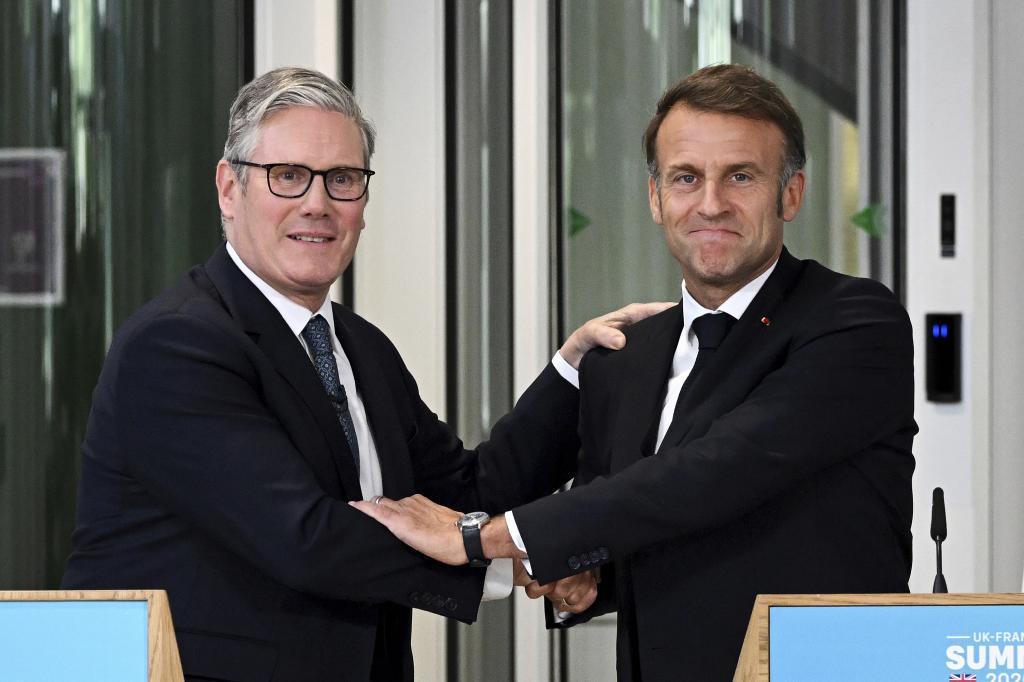Keir Starmer and Emmanuel Macron have revived a kind of nuclear entente cordiale on Thursday. London and Paris have positioned themselves as the leaders of European Defense and Security, using the argument that they are the only two nations in the Old Continent with nuclear weapons and a permanent presence in the UN Security Council.
They have maintained the plan to send peace troops to Ukraine, decided the headquarters of this military operation, expanded a joint action force of both countries from 10,000 to 50,000 soldiers, and agreed to "coordinate our independent nuclear deterrence forces", so that "from today, our enemies must know that an extreme threat against this continent will trigger a joint response from our two countries."
Neither Starmer nor Macron clarified the terms of this nuclear cooperation. They also did not delve into details of other agreements, including coordinating the patrol routes of the nuclear submarines of both countries. The entire process will be coordinated by a "nuclear coordination group," consisting of a member from the Elysée and another from the British government. Thus, both countries will have "independent but coordinated" nuclear forces.
This is the most significant step in coordinating nuclear defense systems between both countries since their existence seven decades ago. Until now, France had maintained strict control over its nuclear arsenal, which, according to experts, had led to maintenance issues and technological lag. United Kingdom had subjected its nuclear arsenal to the United States, to the extent that it depends technologically on Washington, which can practically block its use. The new situation also poses a potential problem for the British nuclear deterrence doctrine, as it is based on NATO defense, not European defense, a subtle but crucial distinction, given that the United States and Canada are members of the Atlantic Alliance.
Therefore, similar to the first entente cordiale that took place in the late 19th and early 20th centuries, this agreement is not based on any legally binding treaty but on a series of agreements aimed at enhancing collaboration in sensitive areas of national sovereignty such as nuclear deterrence and the development of new weapons, including, as Macron and Starmer have pointed out, the successors of the Storm Shadow cruise missiles - jointly manufactured by both countries and which have played a decisive role in Ukraine - and a future long-range missile.
This marked the end of Macron's three-day State visit to London - the first by a European leader since Brexit - where immigration was a key issue, but there was also time and willingness to discuss Europe's strategic role. A strategic role that both want to lead. The message conveyed on Thursday from London was clear: that the capital and Paris are assuming leadership in European Defense.
In the more immediate context, which is Ukraine, Starmer and Macron have unofficially launched the so-called Volunteer Coalition, that is, the peace force that will be responsible for protecting Ukraine if some form of ceasefire or agreement to cease hostilities is reached between that country and Moscow. The force will have its headquarters in Paris, with a coordination cell in Kiev, and although details about its composition and size have not been made public, everything indicates that there will be a ground troop contingent in the country, to which, as Starmer has stated, naval and air units are being considered to be added.
The situation in Ukraine occupied a significant part of the two leaders' agenda, as on Thursday, a virtual summit of the Volunteer Coalition was held, attended by Ukrainian President Volodymyr Zelensky, German Chancellor Friedrich Merz, and Italian Prime Minister Giorgia Meloni, in addition to Starmer and other European leaders. The most significant aspect was the presence, for the first time, of a representative from U.S. President Donald Trump, who has been trying unsuccessfully for six months to convince Vladimir Putin to agree to a ceasefire or peace deal.
The Washington representative was retired General Keith Kellogg, Trump's special envoy for Ukraine, who has been trying to forge a peace agreement with Putin for over a year - even before the current president won the elections. In recent days, Trump's frustration with Russia seems to have significantly increased, given the fierce increase in Russian bombings on Ukrainian cities. On the night from Wednesday to Thursday, Moscow unleashed one of the most severe air attacks on Kiev, just on the eve of the coalition summit and another meeting in Rome, chaired by Meloni, where the reconstruction of Ukraine post-war was discussed. This stance clearly indicates that the Kremlin does not want peace.
